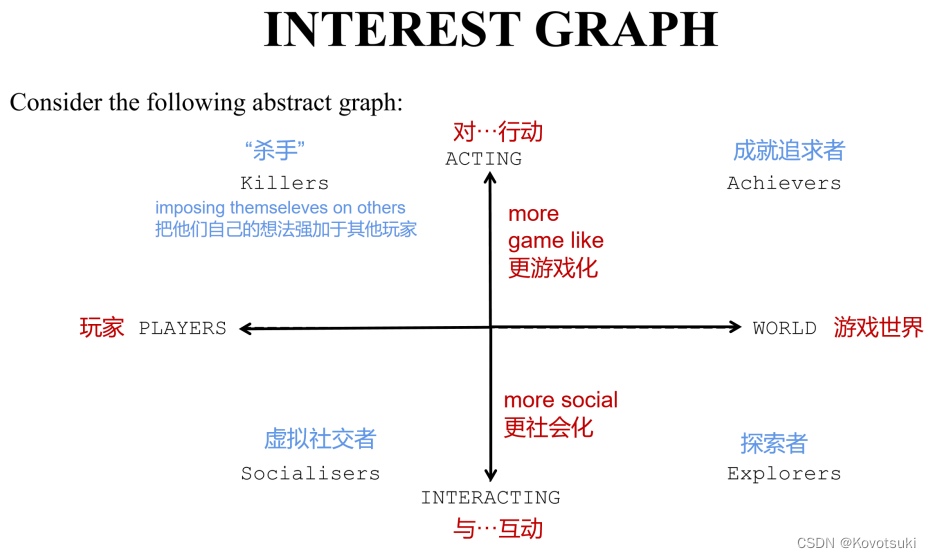前言:这一讲介绍两篇了关于玩家分类的研究论文,感觉课程设计上主要不是讲到底分几类,而是介绍研究方法。国服游戏运营们应该会感兴趣。
Readings
Bartle, Hearts, clubs, diamonds, spades: Players who suit MUDs
www.researchgate.net/publication/247190693
Yee, Motivations of Play in Online Games
Motivations for play in online games - PubMed
(文章被美国国立卫生院数据库收录)
Concepts/Keywords
·Achievers, explorers, socializers (追寻)成就者、(游戏)探索者、(虚拟)社交者
·MUD (MOO, MUSH) Multi User Domain
多人在线网络游戏的原始形式、基于交互式文本、没有图形界面的地牢文字冒险游戏的多人在线版
·Qualitative v. Quantitative research
定性与定量研究(两篇论文对玩家分类采用了不同的研究方法)
Goals
·Students should understand different motivations of play, how people play together in online worlds
明白不同的玩家具有不同的游戏动机,了解玩家如何在在线世界里共同游戏
·Basic understanding of online communities
对在线社区有个基本的认识
·Different approaches (qualitative vs. quantitative)
了解研究的不同方法(定性与定量)
Richard Bartle:
MUD pioneer, academic (Computer Science).
网游先驱者,英国作家、教授和游戏研究员,文章总被引用次数超过3千次,于1978 年创建了第一个MUD游戏:MUD1
Written in 1996, from the point of view of a developer
文章写于1996年,以游戏开发者的角度对其游戏的玩家进行了分类
Design advise, foundational paper.
这篇文章是游戏设计领域的基础之一
QUALITATIVE METHODS (very loose, informal)
然而文章采用的是定性分类方法
(不够严格,方法也非正式统计学手段,两个轴分出四类玩家)
define: MUD, MOO
定义了多人在线域(当时认为这种多人在线交互系统不单纯是游戏)
Nick Yee:
Researcher, psychologist (Psychology)
美籍华人学者,心理学家,研究虚拟环境中的自我表现和社交互动。
(哈弗心理学博士,斯坦福传播学博士)
2007, critique of Bartle
文章发表于07年,批判了上一位的研究方法
Focus on self-report of players
文章采用了问卷的方法,让玩家自主总结游戏动机
QUANTITATIVE METHODS (strict v. formal, good sample size (3000 played) and responses)
定量研究方法
(合适的样本量大小:3000人,问卷包含40个问题,PCA主成分分析归纳出10类玩家,再做回归计算类别间的相关性)
Q: Motivations for play (or NOT playing). If playing online game, report any differences
Go through Bartle's classification
Richard Bartle对玩家的分类如下,有四类:

Achievers 成就追求者:
Players who give themselves game-related goals, and vigorously set out to achieve them.
为自己设定与游戏相关的目标,并努力实现这些目标的玩家。
Achievement within the game context.
在游戏环境中取得的成就。
Explorers 探索者:
Find out as much as they can about the virtual world.
尽可能多地了解虚拟世界。
Exploration of the game.
探索游戏本身
Socialisers 虚拟社交者:
Players use the game’s communicative facilities and apply the role-playing that these engender, as a context in which to converse with other players.
玩家使用游戏作为交流工具,并将这些工具产生的角色扮演作为与其他玩家对话的基础。(语C
·Bartle's achievement is describing an ECOLOGY of players
Bartle 的成就在于描述了玩家间的生态学关系
(比如Achievers就是天天刷深渊,刷排名的,他们往往需要借助Explorers对游戏规则的发掘。而Socialisers的二次创作可以为游戏带来更多新玩家,强化游戏世界的现实联系。Killers是捕食者,他们的快乐建立在其它玩家的痛苦上。)
·Players have different motivations – but they complement each other in virtual worlds
玩家们具有不同的动机——但他们的特点在虚拟世界中互补
·division of players can also be applied to single-player games, describes a variety of approaches to play
基于网游的玩家分类也可以被应用在单机玩家身上,用于描述不同的玩游戏方式
·Online games like World of Warcraft try to appeal to all types of players. But other online worlds can apply to specific players
有些网游想要吸引所有类型的玩家,比如《魔兽世界》
而有的网游只吸收特定类型的玩家
- Achievers/Explorers (WORLD) – Minecraft
成就/探索(虚拟世界)-《我的世界》
- Killers – Online shooting (acting)
“杀手”-在线射击游戏
- Socializing – chat rooms
专注社交-聊天室
GO THROUGH RESPONSES, try to classify.
Critique of Bartle 对Bartle 的批判:
·Motivations can change over time, different goals for the same player
玩家的游戏动机可以随时间发生变化,同一个玩家可以有不同的目标
·Limited actions covered. Current games motivations that can't be classified here:
对玩家行为的分类太少。目前不能被其分类包含的游戏动机有:
- Narrative Experience
叙事体验
- Making Things (even though this was possible in MUDs)
创造东西(在MUD里玩家可以创造新的Object)
- Griefing (although it's briefly addressed)
让其它玩家伤心
- Researchers!
科研人员!
Yee's critique of Bartle Yee对Bartle 的批判:
· 4 types not empirically proven
4种分类来自经验,而且未经验证
· Bartle assumes player types don't combine traits
Bartle 先入为主的假设玩家不会同时具有多种动机
· Types may not be independent, there may be correlations
玩家分类不一定是玩家独立的,各类之间可能存在相关性
Yee's found 10 components for motivation in 3 groups:
Yee的研究发现了10种动机,可以被分为三大类:
Achievement 成就:
· Advancement (Progress, Power, Accumulation, Status)
进步(进展、力量、积累、状态)
· Mechanics (Analysis, Systems, Optimization)
机制(分析、系统、优化)
· Competition (Challenging others)
竞争(挑战他人)
Social 社会:
· Socializing (Chat, Help others, Making friends)
社会化(聊天,帮助他人,结交朋友)
· Relationships
关系
· Teamwork (Collaboration, Group achievement)
团队合作(合作,团队成就)
Immersion 沉浸 :
· Discovery (Exploration)
发现(探索)
· Role-Playing (Story-line, Roles, Fantasy)
角色扮演(故事线,角色,幻想)
· Customization (Appearances, Accessories)
个性化(外观,装饰)
· Escapism (Escape from real life)
逃离主义(逃避现实生活)
Can we classify ourselves better with Yee's motivations?
(it's a chart, not little boxes to put ourselves into)
→ What type of player is Twixt?























 被折叠的 条评论
为什么被折叠?
被折叠的 条评论
为什么被折叠?








